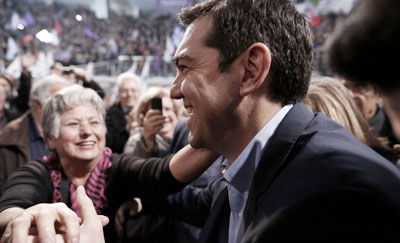Revenge of Disaffected Europe Risks Crisis Sparked in Greece

They speak different languages, they come from different backgrounds, yet all have the same message of frustration that’s threatening to redraw the European political map over the next year.
Starting with elections this Sunday in Greece and heading west to Ireland via Britain and Spain, polls show Europeans will vent their anger over issues from widening income disparities and record unemployment to unprecedented immigration.
For Athens pensioner Irini Smyrni, the moment she’d had enough was when her younger daughter lost her job with the government last year. For Dublin florist Nicola Johns, it was when her business fell behind on rent.
“We pay, we pay, we pay,” said Smyrni, 73. “Our homeland unfortunately is taking us backwards — paltry wages, miserable pensions — and we’re looking for something better.”
English electrical technician David Liddle wants someone to stick up for people like him rather than immigrants and “scroungers.” Virginia Sanchez, an unpaid university researcher in Madrid, said she just grew tired of being failed by the usual politicians unable to improve her prospects.
“I keep going because there’s nothing else to do,” said Sanchez, 23, who graduated in biology last year.
Lost Citizens
Disaffection with what is seen as a ruling elite and a sense of being left behind in an increasingly globalized world are complaints heard across Europe on varying points of the political spectrum as the continent struggles to recover from successive waves of financial and economic crises.
“Political elites have lost track of their citizens, who feel insecure amid all the economic and social pressures,” said Daniela Schwarzer, director of the German Marshall Fund’s Europe program in Berlin. “There’s a growing questioning of the political establishment across Europe.”
European Central Bank President Mario Draghi today is expected to announce the latest efforts by his monetary policy makers to foster economic growth in the euro region by injecting money into the financial system. It’s unlikely to make enough of a difference to deter people from protesting at the ballot box.
The result is that people are abandoning parties used to being in government, those deemed safe to lead by creditors, investors and European bureaucrats.
“If the moderates of Europe do not get together and change things in a meaningful way, I believe there is a risk that the political extremists will be the biggest threat to the euro,” Ray Dalio, founder and majority owner of the $160-billion hedge fund manager Bridgewater Associates, said in a panel debate Thursday at the World Economic Forum in Davos, Switzerland.
This weekend, Smyrni will vote for Syriza, which has pledged to halt the spending cuts that were tied to Greece’s financial rescue. The party looks like it could unseat the government after narrowly losing in 2012. Liddle has switched allegiance to the anti-immigration U.K. Independence Party before an election on May 7.
Disintegrating Europe
Sanchez says Podemos in Spain is giving her hope as the party, founded only last year, tops opinion polls before a vote by the end of this year. Sinn Fein is doing the same for Johns. Irish elections are due by April next year at the latest.
“The underlying current of voter migration starts in Greece and is reflected elsewhere,” said Jens Bastian, an economist and former member of the European Commission’s Greek task force. “If you look at what may happen in Britain or Spain, and you still have a Syriza government in power by then, you’re looking at a completely different Europe.”
In the extreme, it’s a period that could lay the foundations for Greece leaving the euro and the U.K. ditching the European Union, unraveling decades of integration since World War II. At the least, it’s likely to send shockwaves through parliaments and financial institutions.
The euro has declined more than 14 percent against the dollar in the past year. In other currency markets, traders expect the pound to react to political wrangling after the U.K. election, with implied price volatility against the dollar for the next six months climbing to the highest since June 2012.
Strong Stomach
Borrowing costs for Greece, which triggered the continent’s debt crisis, already are rising again. The yield on 10-year government bonds jumped above 10 percent this month for the first time since September 2013.
“European political risk makes the investing environment only for those who have the intestinal fortitude to take a long-term view,” said Scott MacDonald, head of research at MC Asset Management Holdings LLC, an investment company in Stamford, Connecticut, with $400 million of assets. “Europeans confront a world that has been turned on its head, starting in 2008 and likely to continue for another few years.”
With three days to go until voting in Greece, Syriza is topping opinion polls, ahead of Prime Minister Antonis Samaras’s New Democracy. Socialist party Pasok barely scrapes 4 percent a little over five years since winning elections.
Only Choice
After voting New Democracy, Smyrni switched to Pasok when the party’s spending on state workers provided her family with a living. She said she has only one choice left.
Syriza will “make a change and maybe go toward something better,” said Smyrni.
The Greek economy has shrunk by a quarter, or about 50 billion euros ($58 billion), during a six-year recession that only ended in 2014. Joblessness still exceeds 25 percent, higher for women. A surveyof 1,000 Greek households by the country’s largest association for small businesses found that 47 percent said their income didn’t cover their needs.
Smyrni and her husband rely on his pension of 650 euros a month. Their younger daughter is struggling as a single mother with two children after being dismissed from her job at the Culture Ministry, part of the reductions ordered by international creditors in return for rescue money.
Syriza leader Alexis Tsipras, who at 40 is the same age as Smyrni’s daughter, said the election will pave the way for policy changes across Europe and be followed by victories for Podemos in Spain and then Sinn Fein in Ireland.
Financial Torture
He said this month Greece can’t repay its debt as long as its creditors enforce “fiscal waterboarding” and signaled he will boost government spending.
A European Union survey published in December showed that unemployment remained the most important national concern of EU citizens, with the stagnating economy coming second. The feeling that the worst was still to come for the job market was the majority view in a dozen countries.
Spain has the highest jobless rate in Europe after Greece, leaving multilingual graduates on a fruitless quest for work. At about 24 percent, it’s four times the U.K.’s. and almost double that of neighboring Portugal, where an election is also due this year, though without the same backlash.
Sanchez, the researcher in Madrid, will vote for Podemos, founded by a pony-tailed university lecturer, Pablo Iglesias. Like many Spaniards her age, she lives at home and is supported by her family. She plans to leave to study abroad when the next academic year begins.
Spanish Order
“It’s very depressing to have studied for four years for a degree, to have paid for it, and to find there’s no possibility of finding a job,” she said over coffee with her friend Maria Villar at a Madrid café this month. “Something’s not working.”
The emergence of Podemos upended the political order in Spain, while the People’s Party led by Prime Minister Mariano Rajoy and the opposition Socialists scramble to respond. One or other of the two parties has governed for the past 32 years.
Villar left Spain in 2013 as youth unemployment exceeded 50 percent, to study in the U.S. Both were part of the group of demonstrators who took over Madrid’s central square, the Puerta del Sol, in 2010, to protest austerity and they see Podemos as a more structured version of that movement.
“If Podemos wins, I’ll come back,” said Villar, who also is 23 like her friend. “It would be like when Obama was elected in the U.S., maybe reality won’t change that much, but the very fact that it’s that guy in charge would be so important.”
Polish Competition
A former soldier who did four tours or Northern Ireland during the conflict there, Liddle has two sons. The elder, 30, works in retail in Germany. His 27-year-old makes his money in London erecting scaffolds for building work and has had to fend off competition from Polish migrants, he said.
“All the other parties are out of touch with the people,” Liddle said over tea in the pub where his wife works in Chatham, a town in southern England where UKIP is the most popular party. “I’d like to see change across the board, to see more being done for our sort of people. I’m a middle earner and we seem to take the brunt of it all the time.”
Since the good times came to an abrupt end in 2008, the U.K., Greece, Spain and Ireland either had to bail out their banks, request a bailout by the International Monetary Fund, EU and ECB, or a combination of both. They implemented about $400 billion of combined austerity measures.
Broken Promises
In Ireland, most polls show Sinn Fein is jostling for the lead as it takes on the two established parties that traded power since independence 93 years ago. The former political wing of the Irish Republican Army, re-branded itself as the most prominent opponent of cuts and tax increases. It’s led by Gerry Adams, a Northern Irish politician once synonymous with the conflict in Belfast.
Johns, 39, who manages Round Tower Flowers in Clondalkin, a west Dublin suburb, voted for the Labour Party, part of Ireland’s governing coalition, in 2011 and now backs Sinn Fein. She and her husband, who have three children, used to own their own store before getting into rental arrears.
“The majority of them have had broken promises,” said Johns, wrapping an orange bow around chrysanthemums, roses and lilies. “There’s disillusionment, big time. It’s very tough.”
People Weary
It all sets up what could be the biggest overhaul of the political order in Europe for a generation, and rather than a clash of ideologies, it’s the establishment being taken down by a disparate group of malcontents.
“People’s legitimate expectations have been dashed,” said Alan Ahearne, a former economist at theFederal Reserve who advised the Irish Finance Ministry between 2009 and 2011. “People can tolerate that for a short period, but they need to be able to see the recovery coming, and they can’t. And when they can’t see a recovery, they’ll turn to alternatives.”
Irish Finance Minister Michael Noonan sees a public that’s been worn down by more than seven years of crisis and is no longer willing to follow the incumbent political class.
“People get weary. People get tired,” he said at a conference in Dublin this week. “There’s only one life to live and if a decade is taken out of it because of bad economic management, well then it’s no wonder that people lose heart and their governments lose support.”
Source: Bloomberg – Revenge of Disaffected Europe Risks Crisis Sparked in Greece





























